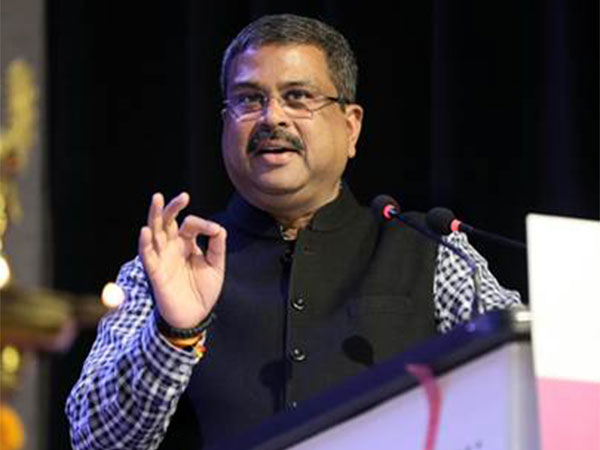
New Delhi: Union Minister for Education Dharmendra Pradhan criticized Congress leader Sonia Gandhi on Wednesday, stating that corruption and governance failures marked the history of India’s education system, and that the National Education Policy (NEP) 2020 signifies a significant departure from this troubled past.
In an article published in The Hindu and shared by the Minister on his social media, Pradhan contended that NEP 2020 is not just an educational reform but also an essential “intellectual decolonization” that India has long awaited, emphasizing that it is a policy created for and by the people for their future.
In her recent remarks, Sonia Gandhi accused the Modi administration of implementing policies that have adverse effects on education, citing issues of centralization, commercialization, and communalism within the Indian education system today.
In response, Pradhan aimed to present the authentic picture of India’s educational evolution, asserting that claims of a deteriorating education system over the last 11 years under Modi’s government are unfounded. He noted that previous governments’ neglect had left a significant impact on education, with India stuck in outdated frameworks since the last major policy modification in 1986, which saw minimal amendments in 1992.
He described the past education policies as reinforcing colonial mindsets and undermining the country’s adaptability to rapid global technological advancements.
Pradhan characterized the previous system as rife with corruption and poor governance, highlighting how public universities faced chronic underfunding and how unregulated private institutions proliferated, turning into “degree mills.” He recalled the notorious 2009 Deemed University scandal, where numerous private institutions received university status without adequate evaluation, resulting in many being guilty of financial mismanagement. Political meddling in academia was widespread, he noted.
The Minister articulated that commissions like the University Grants Commission and the All India Council for Technical Education became tools of control rather than facilitators of excellence, with academic leadership appointments often based on political loyalty.
He criticized the educational content that neglected the contributions of revolutionaries like Bhagat Singh and Chandra Shekhar Azad while manipulating historical narratives to serve political interests, ultimately creating an education system disconnected from India’s rich heritage.
Pradhan defended NEP 2020 as a transformative approach, based on comprehensive democratic discussions, aimed at addressing structural inequities linked to centralized and elitist educational frameworks. He reported significant increases in higher education enrollment among Scheduled Castes (SC), Scheduled Tribes (ST), and Other Backward Classes since 2014-15, along with substantial growth in female enrollment, which surged by 38.8%, reaching over 2.18 crore in 2022-23.
Highlighting improvements in girls’ performance in board exams and a 135% increase in female PhD enrollment, he pointed out that women now represent 43% of higher education in STEMM fields, breaking traditional barriers in these areas. Moreover, the proportion of female teachers rose from 38.6% in 2014 to 44.23%, altering academic leadership.
He noted a fundamental shift in priorities, with per-child government spending rising by 130% from Rs 10,780 in 2013-14 to Rs 25,043 in 2021-22, as the government emphasizes early childhood and foundational education for overall child development.
Government schools are being modernized, and there have been reductions in the number of out-of-school children and dropout rates, alongside improvements in pupil-teacher ratios and learning outcomes.
Pradhan highlighted NEP 2020’s forward-thinking elements, such as introducing coding in middle schools and fostering multidisciplinary problem-solving through innovation hubs, with plans to establish 50,000 additional Atal Tinkering Labs across schools over the next five years.
These initiatives aim to reinvent education for India’s future, moving higher education institutions towards sustainable revenue models. He noted that India has made notable advances, with 11 universities in the QS World Rankings top 500, a jump from a lower position in the past. Research output has increased by 88% since 2015, elevating India to 39th place in the Global Innovation Index from 76th position in 2014. The Anusandhan National Research Foundation promotes research partnerships between industry and academia.
Addressing the issue of language in education, Pradhan stated that NEP 2020 restores prominence to Indian languages and knowledge systems, reversing decades of ‘English-first’ policies. Initiatives like the Indian Knowledge Systems (IKS) curriculum and the Bharatiya Bhasha Pustak Yojana aim to produce 15,000 original and translated textbooks in 22 Indian languages.
Moreover, he pointed out the government’s commitment to social justice, reflected in legislation for reservation in teaching positions for SCs, STs, and others, ensuring a more equitable recruitment process in universities.
Pradhan concluded by asserting that the government is dedicated to creating a “Viksit Bharat,” where education empowers and liberates. He anticipates that the coming decade will bring an educational renaissance that honors India’s past while innovating for the future, enabling the nation to escape the legacy of colonialism and for it to fully realize the aspirations of millions of Indians.
